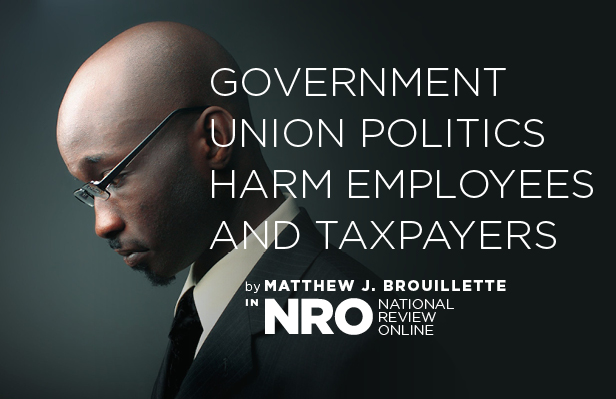Commentary

Gov. Union Politics Harm Employees and Taxpayers
Note: This commentary first appeared in National Review Online.
Government unions aren’t about fighting for public employees and workers any more — they’ve become political operations with agendas that harm both their members and taxpayers. Americans, and even union members themselves, increasingly realize that public-sector unions often do not serve the public interest.
As a consequence, several states — including Washington, Idaho, Utah, Michigan, and Wisconsin — have passed commonsense “paycheck protection” laws to protect employees and taxpayers from being abused by union bosses. Lawmakers in my home state of Pennsylvania are looking to follow their lead. The idea is so sensible that polling suggests the majority of members of Pennsylvania union households support it.
Paycheck protection is a simple reform that would prohibit taxpayer-funded “automatic deduction” of dues and campaign contributions from government-union members’ paychecks. Current law grants government union leaders the unique privilege of using public resources (the government payroll system) to collect their union dues and PAC money, which they use for lobbying and political activity. Dues are mandatory and can go to certain political purposes, while members can agree to make extra donations to PACs — also collected by the state payroll system — which can be spent on almost any political activity.
Like every politically privileged group, union leaders are fighting tooth and nail to hold on to this unfair advantage. Recently, Pennsylvania’s union bosses stormed our state capitol to protest paycheck protection by ranting against “big corporations” and even leading obscene chants. Yet union leaders danced around the core policy issue: whether taxpayer resources should be used for politics.
Perhaps that’s because many bussed-in union protesters actually supported the concept of paycheck protection. When Media Trackers asked protesters why they thought the government should collect their union dues, union members answered that government shouldn’t be involved. Ironically, this is exactly what paycheck protection would mean.
In fact, this is the view of most union members. In a new survey of union households in Pennsylvania, we found that a large majority support paycheck-protection legislation. Nearly two-thirds agreed that such a law would empower workers to have greater control over how their money is spent on politics. Moreover, an overwhelming 80 percent of union households said taxpayer resources should not be used to collect campaign contributions.
Several Pennsylvania legislators have recently gone to prison for using taxpayer resources for politics. Yet government unions are permitted to essentially engage in this practice right under the capitol dome and in public schools across our state.
Taxpayer-funded collection of government-union political money gives union bosses an unfair political advantage. In Pennsylvania, government unions reported spending nearly $5 million in dues on political activity and lobbying in 2012, plus more than $2.6 million in campaign contributions. All of that money was collected using public resources and sent directly to union bosses.
Nationally, the numbers are even more astounding: Labor unions spent more than $1.6 billion on politics in 2011 and 2012.
While government-union bosses argue their political spending will “protect the middle class,” the policies they support actually harm middle-class families, including their own members.
Here in Pennsylvania, union politicking recently blocked pension reform — resulting in higher taxes and teacher layoffs — and liquor-store privatization, despite overwhelming public support for the latter measure, even among union members. Union-funded ad campaigns against charter schools prevented thousands of children from escaping violent and failing schools. Government unions lobbied for Obamacare too, to the detriment of school employees and taxpayers.
Matt Eason, a teacher in the Philadelphia suburbs, opposes his union’s politics: “It’s going against, not only my beliefs and morals and values,” he says. “It’s something I don’t want to support, but I don’t have a choice.”
Because Pennsylvania is a compulsory union state (as opposed to a right-to-work one), paycheck protection would empower teachers like Matt to hold his union accountable. Instead of automatically deducting money from his paycheck, union leaders would have to look Matt in the face each pay period to explain how the union plans to spend his money, and ask for his dues.
Paycheck protection doesn’t silence union voices in politics; nor does it hinder unions’ ability to collectively bargain. It certainly isn’t right to work. It simply means that government unions will have to collect their own dues and political money just like every other private political organization.
Paycheck protection would, however, do one thing that both sides of the political aisle should agree on: Stop spending taxpayer money on politics.
# # #
Matthew J. Brouillette, a former history teacher, is the president and CEO of the Commonwealth Foundation, Pennsylvania’s free-market think tank.